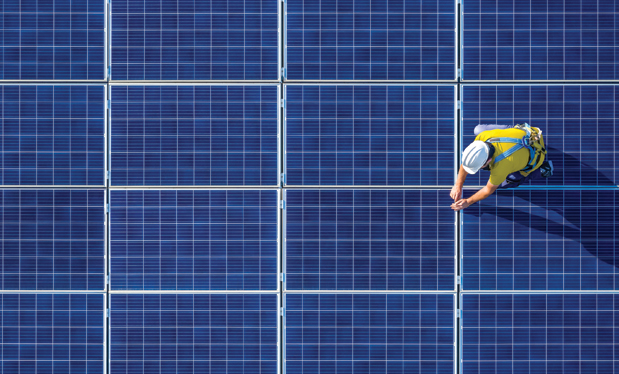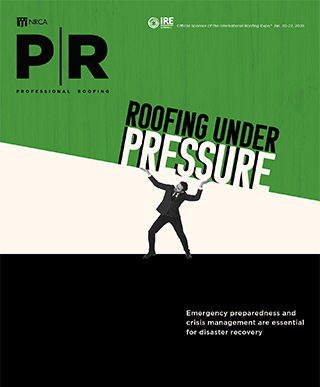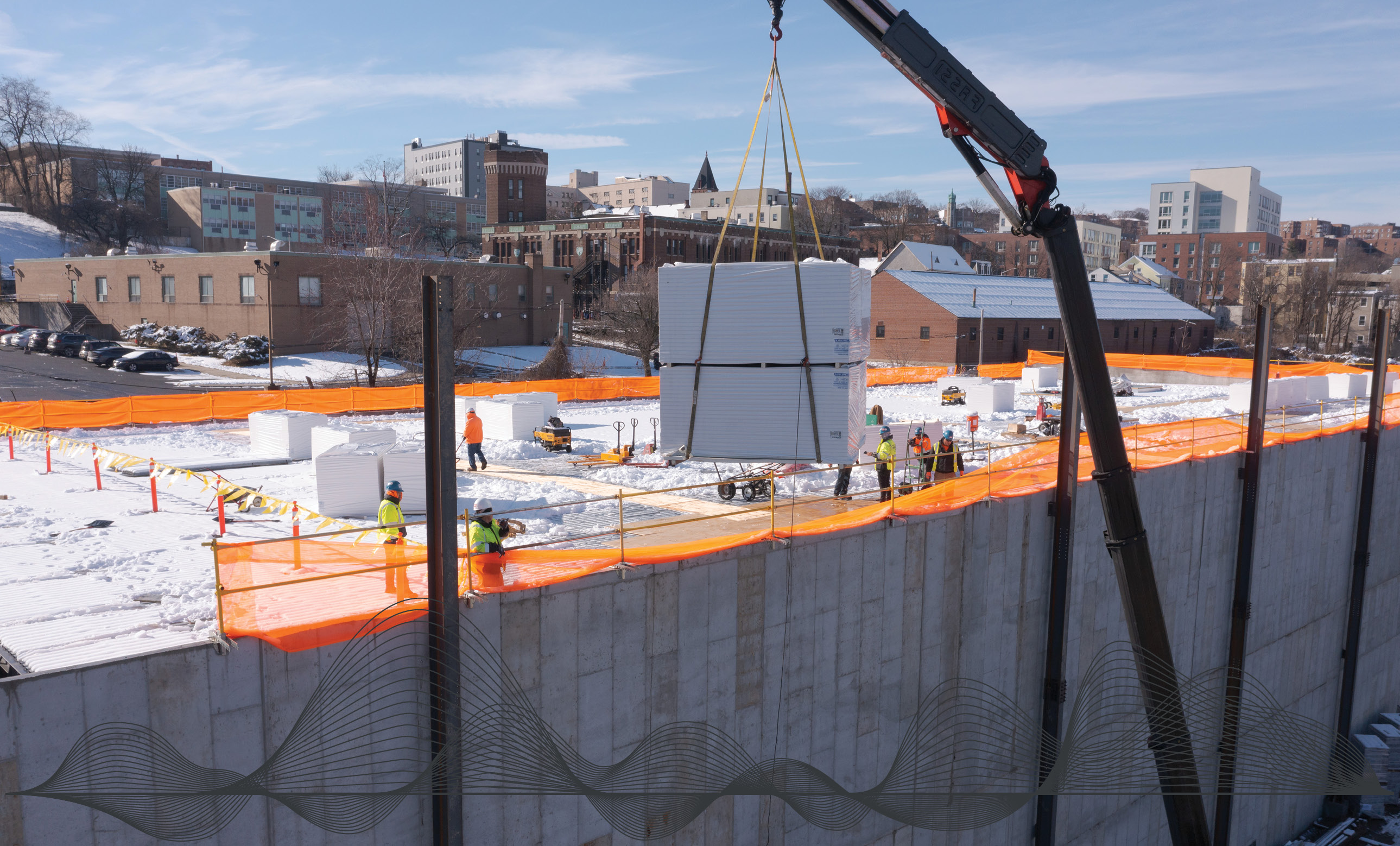
Roofing always has been an industry of innovation. As soon as the latest techniques and technologies are mastered, improvements that challenge roofing contractors to evolve are introduced. Solar roofing is no exception. Since the early days of residential and commercial solar roofing, change has been constant.
Although making the leap into offering solar products may pose challenges to contractors, the upside is simply too great to ignore. From a consumer and commercial standpoint, the demand for solar roofing will continue to grow; for example, consider that by 2050, the Department of Energy expects solar power to make up 45% of the nation’s electricity production. That growth represents a new world of opportunity—and a new potential revenue stream—for your business.
Contractor challenges
The ability to learn and master new techniques and technologies is a prerequisite for success in the roofing industry, which requires constant adaptation to remain competitive. However, industry advancements often introduce new disciplines some roofing contractors may be hesitant to pursue.
Solar is one such area. It entails not only a new array of products and technology but also specific technical expertise. Although it is certainly wise to consider what obstacles may lie ahead, a wealth of information, resources and training exists that provides everything contractors will need. After all, getting up to speed about trends, product offerings and installation training is exactly what contractors have been doing their entire careers. There is a way to overcome every barrier to getting involved in solar roofing regardless of whether that barrier stands in the way of roofing contractors or their customers.
Is it too late to get started?
The time hasn’t passed to start offering solar products. It’s true solar technology is no longer in its infancy, and the establishment and widespread adoption of solar technology has put some roofing contractors at ease and encouraged them to jump in. Others, though, may believe they have fallen too far behind the early adopters to catch up.
Quite simply, this is a misconception. Although solar roofing as a whole is widely known and becoming more accepted in the mainstream, solar technologies such as inverters (which convert direct current energy from the panels into alternating current energy to be fed into the electrical grid) and batteries (which store excess solar energy for later use) are still in startup phases. Batteries in particular offer incredible opportunity as they are still relatively uncommon and provide impressive energy efficiency and cost-savings potential for customers.
In addition, solar panels, which are a well-established technology in the mature phase of development, are dropping to all-time low prices. As innovation and technological development evolve surrounding PV technologies, efficiency will improve and prices could drop further. For roofing contractors, that means greater margins on solar system sales and a larger potential revenue stream.
Plus, adding solar to your business not only gives you the opportunity to win new customers, but it also allows you to offer more options to the customer base you have already built.
Homeowners and business owners are always looking for the most efficient way to meet their roofing needs, and establishing your business as a single source for traditional and solar roofing products helps increase your revenue stream with existing customers. Hybrid contractors can offer customers a one-source, wraparound warranty, providing them with even more value.
The industry is poised not just to expand but to explode in the years to come. There is ample opportunity for those without solar experience to get on board.
I don’t have the right experience
Learning to install solar panels may seem daunting, but it’s no more difficult than the skills you must master to become licensed in the roofing industry. The days are gone when solar installation required fabricating equipment by hand and anchoring panels with wire and bolts; new advancements have made the racking, waterproofing and flashing processes simpler and more streamlined.
The establishment of specialized solar companies in recent years offers the perfect opportunity to train your staff to become experts in solar installation. Engaging in training with solar companies will ensure your team is prepared to properly mount the equipment in compliance with state and national standards. In fact, DOE has established its Solar Training Network to connect professionals with the specialized training opportunities they need to become solar installation experts.
As an alternative to obtaining certification on your own, you can find solar contractor partners willing to teach fundamental solar roof system installation. Partnering with a solar contractor on projects can provide a transition period as you gain confidence and aptitude in solar installation capabilities. The options for learning the on-site portion of solar are multiple, and formulating a plan that works best for your company is an essential step toward establishing your place in the industry. In addition, suppliers such as ABC Supply Co. Inc., Beloit, Wis., make it easy for customers to access product knowledge and installation training.
I don’t have electrical expertise
Once the racking and panels are installed on a solar roof system, the focus turns to converting the solar energy being generated into usable electricity. Some may enjoy learning this component of solar roofing, but many roofing contractors find the electrical portion to be unfamiliar (and uncomfortable) territory. From understanding the wiring and installation nuances between microinverters and string inverters to connecting the system to the building’s electrical panel, successfully implementing electrical components is crucial to a solar roof system.
Many contractors already have employees on staff with electrical experience and the aptitude to become experts in the electrical portion of solar installation—they just need the proper education and application experience. Certification and licensing are required to connect electrical components of a solar system, so employees will need to complete those requisite steps before stepping into that role on your team. Once they do, though, having a go-to electrical person will pay dividends in the long term.
If your staff doesn’t have extensive experience in electrical work or the bandwidth to take on the electrical work on a solar job, partnering with a licensed electrical contractor to handle this work is an easy way to take the burden off your company while ensuring the job is done right.
I don’t want to manage more supplies
As a contractor, you already have the challenge of ordering supplies and maintaining inventory for the services you provide, and you may not be eager to add to that list. Or you may be concerned your suppliers don’t have the solar products you would need to enter the market. Finding the right distributor that can streamline the ordering and delivery process will alleviate those concerns.
For example, ABC Supply makes it easy for contractors by functioning as a single source for residential and commercial projects. The variety of solar products ABC Supply offers allows you to lump all solar and roofing needs into one order, keeping things simple and saving time.
Ordering is only half the battle. Roofing contractors new to the solar industry may not be familiar with the challenge of getting their solar panels onto the rooftops of homes and buildings. Your distributor may be able to help. ABC Supply, for instance, offers rooftop delivery in some markets and can bring supplies straight to the roof, saving time and money and minimizing safety risks.
Customer challenges
It’s not enough for roofing contractors to become confident in the benefits of solar systems and the skills required to offer PV products. Homeowners and business owners who stand to benefit from implementing them must be familiar with the technology, financing possibilities and long-term savings potential before they are willing to invest.
Much like the technology itself, public perception of solar roofing has evolved substantially in recent years. Homeowners, businesses and developers are increasingly looking for ways to consume energy in an environmentally friendly way while saving money on their energy bills.
Even so, a variety of common concerns may hold customers back from making the decision to go with a solar roofing option. You should be equipped to answer these questions to put any concerns to rest and demonstrate how a customer will benefit in the near and long term by choosing a solar roofing solution.
Customers say solar is too expensive
One of the most common misconceptions held by homeowners and businesses alike is the idea solar is too expensive an option to consider. Although this may have been a valid concern in previous decades, growth of the solar industry has made solar much more affordable.
According to the Solar Energy Industries Association, an average-sized residential system has dropped from a pre-incentive price of $40,000 in 2010 to roughly $25,000 today. The reduced price tag alone will be reason enough for many customers to consider choosing a solar system.
In addition to the lower price of equipment, there are long-term cost benefits of solar. One of the most attractive benefits to share with customers is the savings potential of investing in a solar system. For example, the average homeowner operating a 6-kilowatt home solar system will save about $1,500 annually compared with the national electricity price, according to SolarReviews, a consumer website that reviews and rates residential solar panels and solar panel installation companies.
Once this annual cost savings offsets the installation price of the system (usually in about 10 years), customers can pocket that additional savings for the remainder of the system’s life. Plus, as utility prices continue to rise, the cost savings of running a home solar system will increase.
Helping homeowners and business owners understand this long-term perspective rather than fixating on the sticker shock of installation is key for contractors looking to close a sale.
Customers aren’t aware of financing options
Solar system installation, much like any major home improvement project, is a substantial investment, but with solar becoming more mainstream, financing options are more readily available and appealing to homeowners and businesses.
One of the most popular options for financing a new solar system is a solar loan. Like other loans, a solar loan allows customers to purchase a system by making monthly payments to a bank or another creditor. Because solar loans are exclusively for the purchase and installation of solar equipment, monthly payments are often low—in many cases lower than homeowners’ current utility bills, according to CNET. Plus, opting for a solar loan allows customers to take advantage of all available federal and local tax incentives and eventually own the system outright.
Additional financing options, such as solar leases and purchase power agreements, are newer ways for customers to make the leap into the solar world. Although these approaches allow some flexibility for those not wanting to pay larger sums at installation, they don’t offer customers ownership of the system.
Contractors who can help give their customers access to financing through third-party lenders (ABC Supply offers financing through its partnership with lender GoodLeap) will have an upper hand in closing deals when discussing payment options.
Customers are unaware how to offset costs
Given how quickly the solar industry is evolving, it can be difficult to keep up with government regulations and policies. In 2022, Congress passed a federal tax credit for 30% of the installation cost of solar PV systems for eligible homeowners and businesses. This credit, which is in place through 2032, can aid greatly in offsetting installation costs.
Beyond the federal tax credit, favorable state and local incentives add to the benefits for those making the investment in a solar roof system. Policies vary by state and locality, but many governments have implemented tax breaks for solar energy systems. Examples of benefits offered include sales tax exemptions at purchase, property tax breaks for homeowners and other state tax credits similar to those implemented at the federal level.
Additionally, new guidance passed by the Department of the Treasury provides an extra 10% tax credit on U.S.-made solar panels. Customers looking to maximize their cost savings upon installation may consider this extra perk to lower their bills even further by opting for a PV system manufactured in the U.S.
Contractors and customers should consult with tax professionals to ensure they fully understand the expenses included under the federal solar tax credit and additional local policies. With a firm knowledge of the benefits this credit entails, you can enlighten customers about how solar power is a more attainable and financially practical option than they may previously have thought.
Where can you start?
The first step you can take toward offering solar solutions is to gather information and make a plan that best fits your business. One resource that can help is your local building supply representative, who can help set you up with the information you need to start offering solar products.
There is ample opportunity for contractors to take advantage of the solar roofing industry, and there’s no better time to get started than the present.
JAMES MASON is vice president of renewable energy at ABC Supply Co. Inc., Beloit, Wis.



